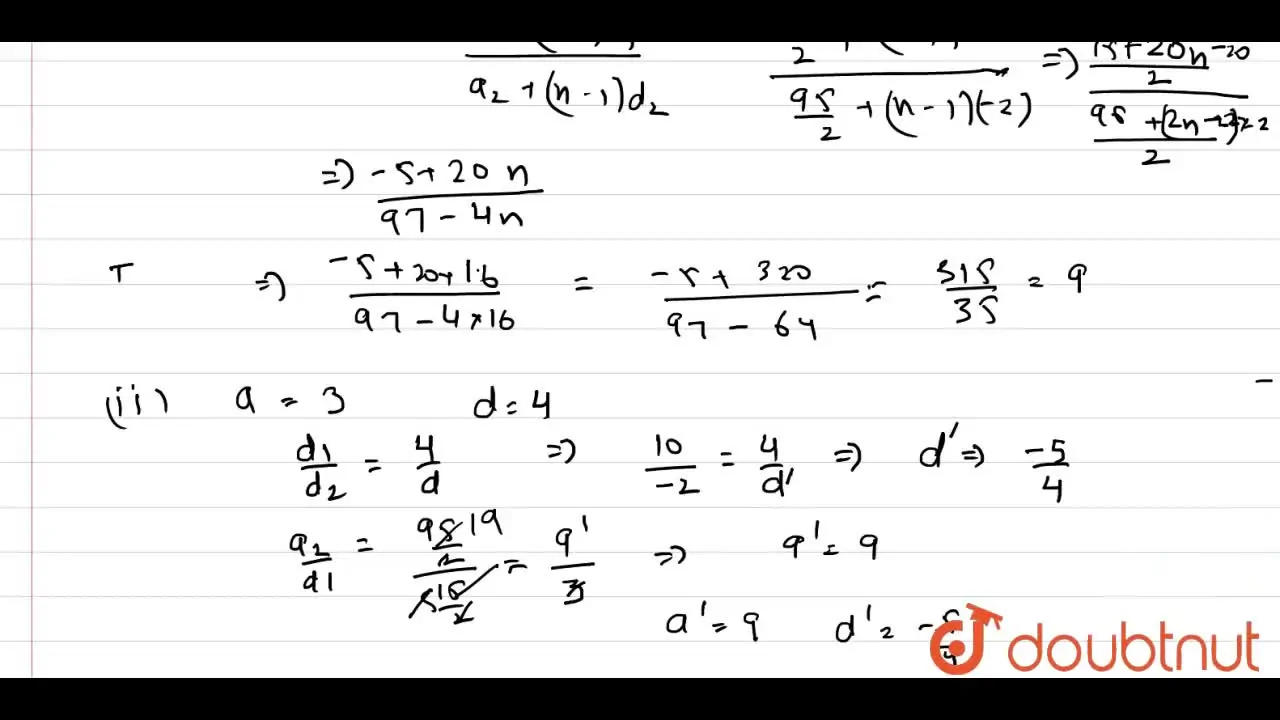The ratio of the sum of n terms of two A.P.'s be 5(2n+1):(97−2n). Find (i) the ratio of their nth terms. Hence, find the ratio of their 16th terms. (ii) If first term and common difference of first A.P. are 3 and 4 respectively, find the second A.P.
(i) Let first term and common difference of one A.P. be a1andd1 and let first term and common difference of second A.P. be a2andd2.
∴SnS∗n=5(2n+1)97−2n (given)
⇒n2[2a1+(n−1)d1]n2[2a2+(n−1)d2]=5(2n+1)97−2n (using formula for sum of n terms)
⇒2a1+(n−1)d12a2+(n−1)d2=5(2n+1)97−2n
⇒a1+(n−12)d1a2+(n−12)d2=5(2n+1)97−2n ...(1) (dividing each term of Nr. and Dr. by 2)
Now, we want the ratio of nth terms i.e., TnT∗n=a1+(n−1)d1a2+(n−1)d2
So, replace n−12→n−1
⇒n−1→2n−2
⇒n→2n−2+1
⇒n→2n−1
∴ Eq. (1) becomes,
a1+(2n−1−12)d1a2+(2n−1−12)d2=5[2(2n−1)+1]97−2(2n−1)
∴ a1+(n−1)d1a2+(n−1)d2=5(4n−1)99−4n
⇒TnT∗n=5(4n−1)99−4n ...(2)
Hence, the ratio of nth terms is 5 (4n-1) : (99-4n).
Put n=16 in the above relation (2), we get
∴T16T∗16=5(4×16−1)99−4×16=5×6335=9:1
(ii) a1=3,d=4
∴ First A.P. is3,3+4,3+2(4),3+3(4),...
i.e., 3, 7, 11, 15, 19, 23, ...,
Put n=1 in eq. (2),
T1T∗1=5(4−1)99−4=5×395=319
⇒3T∗1=319⇒T∗1=19
Arithmetic Progression
Put n=2 in eq. (2),
⇒T2T∗2=5(8−1)99−8=5×791=513
⇒7T∗2=513⇒T∗2=915=1815
∴d−T∗2−T∗1=915−19=−45
∴ Second A.P. is T∗1,T∗2,T∗3,...
i.e., 19,1815,1725,1635,... (T∗3=A2+d^(∗)T∗4=a3+d∗.....)
Related Playlists
- BOOK - NAGEEN PRAKASHANCHAPTER - ARITHMETIC PROGRESSIONEXERCISE - Problem From NCERT/exemplar20videos
ARITHMETIC PROGRESSION
- BOOK - NAGEEN PRAKASHANCHAPTER - ARITHMETIC PROGRESSIONEXERCISE - Exercise 5a5videos
ARITHMETIC PROGRESSION
- BOOK - NAGEEN PRAKASHANCHAPTER - AREA RELATED TO CIRCLESEXERCISE - Revision Exercise Long Answer Question6videos
AREA RELATED TO CIRCLES
- BOOK - NAGEEN PRAKASHANCHAPTER - CIRCLESEXERCISE - Revision Exercise Long Answer Questions3videos
CIRCLES
Similar Questions
The ratio of the sum of n terms of two A.P.'s is (3n+1):(4n+3). Find the ratio of their mth terms.
View SolutionThe ratio of the sum of n terms of two A.P. s is (7n+1):(4n+27) . Find the ratio of their mth terms.
View SolutionThe ratio of the sum of n terms of two A.P.'s is (7n−1):(3n+11), find the ratio of their 10th terms.
View SolutionThe ratio of the sum of n terms of two A.Ps is (7n+1):(4n+27). Find the ratio of their mth terms.
View SolutionThe first term and common difference of an A.P. are 3 and -2 respectively . Find its 6th term.
View SolutionThe ratio of sums of n terms of two A.P'. is (7n + 1) : (4n + 27). Find the ratio of their 11th terms.
View SolutionIf the ratio of the sum of 'n' terms of two A.P's is (5n+4) : (9n+6), find the ratio of the 18th terms of these A.P.'s.
View SolutionThe sums of first n terms of two A.P. 's are in hte ratio (7n+2):(n+4). Find the ratio of their 5th terms.
View SolutionIf the ratio of the sum of the first n terms of two Aps is (7n + 1) : (4n + 27) then find the ratio of their 9th terms.
View SolutionThe ratio between the sum of first n terms of two A.P.'s are in the ratio (7n-5) : (5n+17). Find the ratio of their 10th terms.
View Solution


